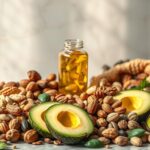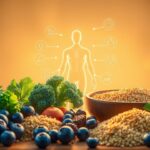Eating organic is becoming more popular, and for good reasons. It offers many benefits, like better health and helping the environment. Knowing what makes food organic and how it boosts our health is key. Organic food improves our health, supports the environment, and tastes better.
Choosing organic food is not just good for us, but also for the planet. It supports farming that uses fewer harmful chemicals and keeps soil healthy. The advantages of organic eating are clear, making it a healthier and greener choice.

Introduction to Organic Food
It’s important to understand organic food to make better diet choices. Organic food has less pesticide residue, more nutrients, and tastes better. Exploring these benefits in depth is crucial.
Key Takeaways
- The benefits of eating organic include improved health and wellness
- Organic food benefits the environment by reducing the use of harmful chemicals
- Organic food has higher nutrient content and better taste
- The benefits of eating organic are widely recognized
- Choosing organic supports sustainable farming practices
- Organic food benefits our overall health and well-being
Understanding What Makes Food Organic
When you think about eating organic, it’s key to know why. Organic food is certified by groups like the USDA. They make sure farms follow strict rules. These rules help protect the environment and support farming that’s good for the planet.
Organic food has fewer harmful chemicals and pesticides. Organic farms fight pests with natural methods, not chemicals. This is better for the planet and makes food healthier for us.
Organic Certification Standards
Getting organic certified is tough. Farms must pass a detailed check. The USDA Organic seal shows a product meets these high standards. Farms must use organic methods, avoid GMOs, and keep detailed records.
Common Organic Labels Explained
You might see labels like “Non-GMO” and “Made with Organic Ingredients.” Knowing what these mean helps you choose better. These labels help support farming that’s good for the planet and our health.
The Difference Between Natural and Organic
Natural and organic are not the same. Natural products might not have artificial stuff but could still be farmed the old way. Organic products, however, must follow strict rules. Choosing organic means you’re eating healthier and helping the environment.
| Label | Description |
|---|---|
| USDA Organic | Meets USDA organic certification standards |
| Non-GMO | Does not contain genetically modified organisms |
| Made with Organic Ingredients | Contains at least 70% organic ingredients |
The Benefits of Eating Organic: Impact on Your Health
Eating organic food can greatly improve our health. It offers many health benefits of organic food that make it a smart choice. By choosing organic, we lower our exposure to harmful chemicals like pesticides and heavy metals. These are often found in non-organic produce.
Some of the key health benefits of organic food include:
- Lower risk of chronic diseases, such as heart disease and diabetes
- Higher nutrient content, including vitamins and minerals
- Lower exposure to pesticide residues and heavy metals
Eating organic food also supports overall wellness and a healthy lifestyle. With the numerous health benefits of organic food, switching to organic can significantly improve our health and well-being.
By adding organic food to our diets, we can actively work to keep ourselves healthy. We also reduce our risk of chronic diseases. With the many health benefits of organic food out there, choosing organic is an easy decision.
Reduced Exposure to Harmful Chemicals
Choosing organic food over conventional has a big advantage. Organic farming uses fewer harmful chemicals. This means less exposure to pesticides, heavy metals, and synthetic fertilizers.
Organic farming avoids these toxic substances. This makes organic food safer for us. It also helps keep our environment healthier.
Studies show organic produce has less pesticide residue. Organic farming doesn’t use GMOs. This means we avoid genetically modified organisms when we choose organic.
Pesticide Residue Comparison
- Conventional produce: higher levels of pesticide residue
- Organic produce: lower levels of pesticide residue
- Benefits of organic farming: reduced exposure to harmful chemicals
Conventional farming also uses heavy metals and synthetic fertilizers. These can harm soil and water. They’re bad for our health and the planet.
Organic farming uses natural ways to fight pests and diseases. This means less need for harmful chemicals.
| Conventional Farming | Organic Farming |
|---|---|
| Higher levels of pesticide residue | Lower levels of pesticide residue |
| Use of heavy metals and synthetic fertilizers | Natural methods to control pests and diseases |
Choosing organic food helps us avoid harmful chemicals. It’s better for our health and the planet. The benefits of organic farming are clear.
Superior Nutritional Profile of Organic Foods
Organic foods have a better nutritional profile than non-organic ones. Organic farming methods help keep the soil healthy and diverse. This leads to more vitamins, minerals, and antioxidants in organic fruits and veggies.
Some key benefits of organic produce include:
- Higher antioxidant levels
- Lower levels of heavy metals and synthetic fertilizers
- Increased levels of essential vitamins and minerals
Choosing organic produce means getting a more nutritious diet. This can greatly improve your health and well-being.

Research has shown that organic produce tends to have a superior nutritional profile, making it a healthier choice for consumers.
In conclusion, organic foods are a great choice for a healthier diet. With their many benefits, it’s easy to see why more people are choosing organic.
| Organic Produce | Conventional Produce |
|---|---|
| Higher antioxidant levels | Lower antioxidant levels |
| Lower levels of heavy metals and synthetic fertilizers | Higher levels of heavy metals and synthetic fertilizers |
| Increased levels of essential vitamins and minerals | Lower levels of essential vitamins and minerals |
Environmental Advantages of Choosing Organic
Eating organic is good for your health and the planet. Organic farming keeps soil healthy and supports many species. This helps our ecosystem stay balanced. By picking organic, we help make food production better for everyone and the environment.
Here are some big wins for the environment when we choose organic:
- Soil conservation: Organic farming keeps soil rich and prevents erosion.
- Water conservation: It uses less water than traditional farming, saving this vital resource.
- Carbon footprint reduction: Organic farming is kinder to the planet, reducing harmful emissions.
Our food choices affect the planet a lot. Choosing organic is more than just a personal choice. It’s a way to help the planet. By supporting organic farming, we work towards a greener food system.
Every time we choose what to eat, we can help the environment. We can avoid harmful chemicals and support green farming. So, let’s pick organic and make a healthier choice for ourselves and the planet.
The Taste and Quality Difference
When thinking about why choose organic food, the taste and quality stand out. Organic produce is fresher, more flavorful, and has a better texture. This is because organic farming focuses on soil health, making the food more nutritious and tasty.
Some key benefits of organic food are:
- Fresher produce with a longer shelf life
- More intense and complex flavors
- Better texture and crunch
- Higher nutritional value
Choosing organic means enjoying better taste and quality. It’s a smart choice for your health and well-being.

Many consumers have reported a significant difference in the taste and quality of organic food compared to conventional options, citing the freshness and flavor as the primary reasons for their preference.
In conclusion, the taste and quality difference is a big reason to choose organic food. With its superior flavor, texture, and nutritional value, organic food is a great choice for those looking to elevate their dining experience and prioritize their health.
Supporting Local Farmers and Communities
Choosing organic produce is good for our health and the planet. It also helps local farmers and communities. By supporting local farmers, we help build sustainable food systems. These systems are key for food security and sovereignty.
The benefits of organic farming go beyond personal health. It creates jobs and boosts local economies. This leads to fresher, more nutritious food and a stronger community.
Economic Impact of Organic Farming
- Creates jobs and stimulates local economies
- Contributes to building sustainable food systems
- Supports local farmers and communities
Building Sustainable Food Systems
Choosing organic helps support local farmers and communities. It also promotes a sustainable food system. This approach keeps ecosystems healthy, supports biodiversity, and ensures food for the future.
Smart Shopping Tips for Organic Foods
Adding organic foods to your diet can seem pricey. But, with smart shopping, you can enjoy organic benefits without spending too much. Knowing the benefits and making smart choices helps you spend wisely.
Focus on key organic items, like those with high pesticide residue. The Clean Fifteen and Dirty Dozen lists guide you. They help you choose which organic foods to buy first.
The Clean Fifteen and Dirty Dozen
The Dirty Dozen list shows produce with high pesticide residue. These are top picks for organic shopping. The Clean Fifteen list has produce with less pesticide residue. This gives you more options in your shopping.
Budget-Friendly Organic Shopping
To shop for organic foods on a budget, try these tips:
- Buy in bulk: Organic staples like grains, nuts, and dried fruits are cheaper in bulk.
- Shop at local farmers’ markets: You get organic produce at good prices and support local farmers.
- Plan your meals: Cooking with organic ingredients at home is cheaper than processed or pre-prepared meals.
By using these tips and understanding organic benefits, you can enjoy organic eating without overspending. Every choice you make matters for your health and the planet.
Conclusion: Making the Switch to Organic Living
The benefits of eating organic are clear. They include better health and helping the environment. Choosing organic is good for us, the planet, and local communities.
By understanding the advantages of organic eating, we can easily switch to organic living. Smart shopping strategies help make this transition smooth.
Organic food offers many health and environmental benefits. It’s important to make organic choices every day. This promotes a healthier, sustainable food system for us and future generations.
Now is the time to embrace organic living. The positive impact we can have is truly remarkable.
Disclaimer: This article is for informational purposes only and does not constitute medical advice. Always consult a healthcare professional before starting a new exercise or wellness routine.
FAQ
What are the benefits of eating organic food?
Eating organic food can improve your health and wellness. It reduces exposure to harmful chemicals. Organic food also has a better nutritional profile and is better for the environment.
Organic food is made without synthetic pesticides, fertilizers, or GMOs. This makes it a healthier choice.
How does organic certification work?
Organic certification is overseen by organizations like the USDA. They set strict standards for organic farming and production. Labels like “USDA Organic” and “Non-GMO” show a product meets these standards.
It’s key to know the difference between natural and organic. Natural products might not be organic.
What are the health benefits of eating organic food?
Eating organic can improve your health. It reduces exposure to pesticides, heavy metals, and toxic chemicals. Organic produce is often richer in vitamins, minerals, and antioxidants.
This can lead to a more nutritious diet and lower disease risk.
How does organic farming benefit the environment?
Organic farming boosts soil health and biodiversity. It conserves water and lowers carbon footprint. Choosing organic supports a sustainable food system and helps protect the environment.
What is the difference in taste and quality between organic and conventional food?
Organic produce is often fresher and more flavorful. It has a better texture than conventional options. This is because organic farming focuses on soil health, making produce more nutritious and delicious.
How can I support local farmers and communities by choosing organic?
Choosing organic supports local farmers and communities. It creates jobs and boosts local economies. Organic farming also promotes biodiversity and builds sustainable food systems.
These are key for food security and sovereignty.
How can I make organic food more affordable?
To make organic food more affordable, use the Clean Fifteen and Dirty Dozen lists. Prioritize which organic products to buy. Shopping at local farmers’ markets, buying in bulk, and using budget-friendly tips can also help.







1 thought on “The Benefits of Eating Organic”